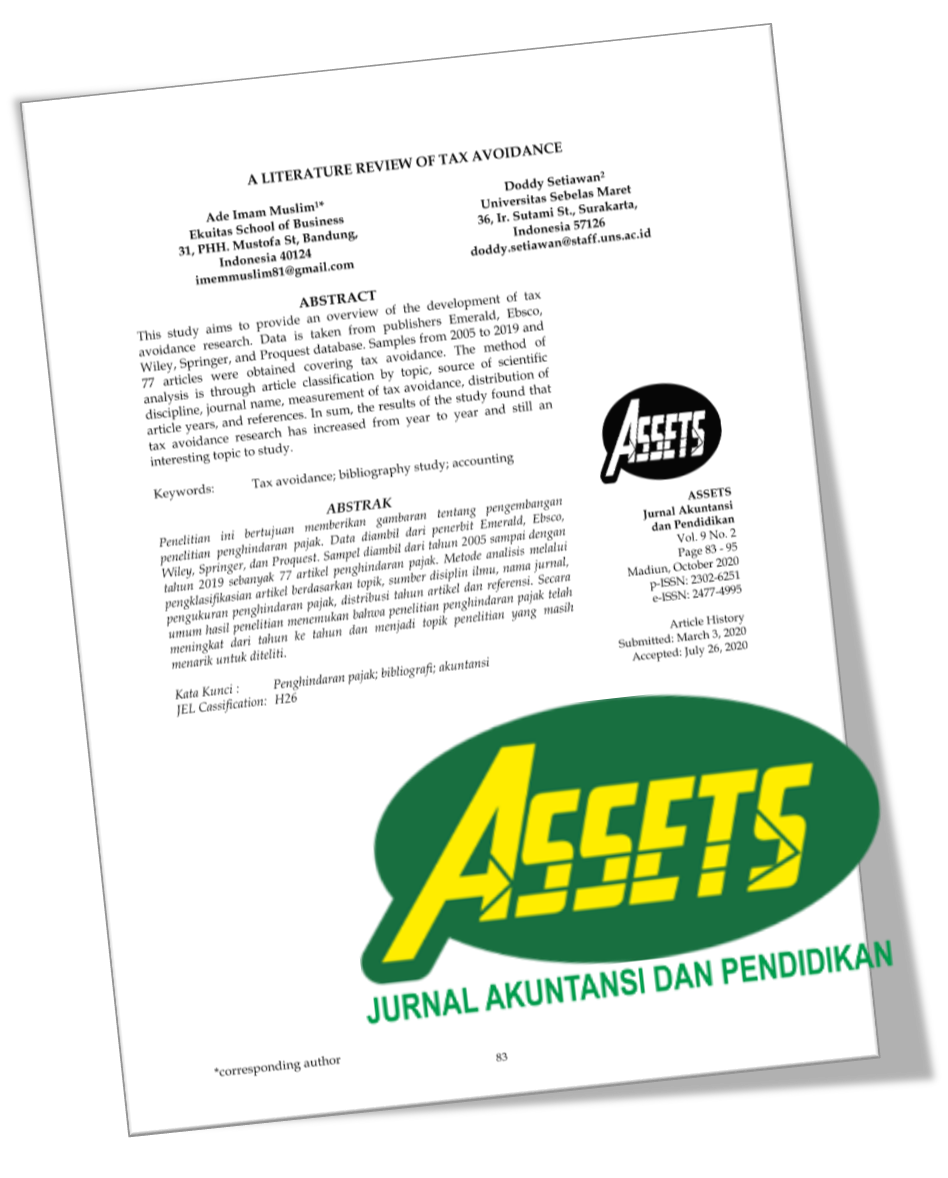Minat Generasi Milenial untuk Berwirausaha
DOI:
https://doi.org/10.25273/jap.v7i2.3320Keywords:
Minat Berwirausaha, Generasi Milenial, Pendidikan Kewirausahaan, Desirability, FeasibilityAbstract
Downloads
References
Ajzen, I. (1991). The theory of planned behavior. Orgnizational Behavior and Human Decision Processes, 50, 179–211.
Ajzen, I., & Fishbein, M. (1980). Understanding Attitudes and Predicting Social Behavior. New Jersey: Prentice Hall International Inc. Budiadji.
Appelbaum, S.H., Roy, M. and Gilliland, T. (2011). Globalization of performance appraisals: theory and applications. Management Decision, 49(4), 570–585.
Bharanti, B. El., Idrus, M., Zain, D., & Solimun. (2012). Pengaruh Pendidikan Kewirausahaan dan Stereotip Gender terhadap Intensi Kewirausahaan yang Dimediasi oleh Kebutuhan Berprestasi dan Efikasi Diri. JUrnal Aplikasi Manajemen, 10(3).
Bonet, F.J.P., Peris-Ortiz, M. and Pechua´n, I. (2011). Basis for a general theory of organizations. Management Decision, 49(2), 270–283.
Cambra f, J., Florin, J., Perez, L., & Whitelock, J. (2011). Inter-firm market orientation as antecedent of knowledge transfer, innovation and value creation in networks. Management Decision, 49(3), 444–467.
Dissanayake, D. (2013). The Impact of Perceived Desirability and Perceived Feasibility on Entrepreneurial Intention among Undergraduate Students in Sri Lanka: An Extended Model. The Kelaniya Journal of Management, 2(1), 1–13.
Efrata, T. C. (2016). Pendidikan kewirausahaan terhadap minat berwirausaha: mediasi perceived desirability, mediasi perceived feasibility dan moderasi model peran. Disertasi. Program Doktor Ilmu Manajemen Universitas Brawijaya.
Guerrero, M., Rialp, J., & Urbano, D. (2008). The impact of desirability and feasibility on entrepreneurial intentions : A structural equation model, 35–50.
Guzma, C. (2012). Entrepreneurial intention models as applied to Latin America, 25(5), 721–735.
Guzmán-Alfonso, C., Guzmán-Cuevas, J. (2012). Entrepreneurial intention models as applied to Latin America. Journal of Organiz Ational Change Management, 25, 721–735.
Hattab, H. W. (2014). Impact of Entrepreneurship Education on Entrepreneurial Intentions of University Students in Egypt. The Journal of Entrepreneurship, 23(1), 1 – 18.
Huang, J.Y., Chou, T.C. and Lee, G. G. (2010). Imitative innovation strategies: understanding resource management of competent followers. Management Decision, 48(6), 952–975.
Krueger, N. F., Reilly, M. D., & Carsrud, A. L. (2000). Competing Models Of Entrepreneurial Intentions, 9026(98), 411–432.
Krueger, N.F., Brazeal, D. V. (1994). Entrepreneurial potential and potential entrepreneurs. Entrepreneurship Theory and Practice, 18, 91–91.
Lanero, A., Vázquez, J. L., & Gutiérrez, P. (2011). The impact of entrepreneurship education in European universities : an intention-based approach analyzed in the Spanish area, 111–130.
Lee, S. H., & Ngoc, H. T. B. (2010). Investigating the on-line shopping intentions of Vietnamese students: An extension of the theory of planned behaviour. World Transactions on Engineering and Technology Education, 8(4), 471–476.
Liñán, F. (2014). Intention-Based Models of Entrepreneurship Education, (January 2004).
Lindblom, A. and Tikkanen, H. (2010). Knowledge creation and business format franchising. Management Decision, 48(2), 179–188.
Lorz, M. (2011). The Impact of Entrepreneurship Education on Entrepreneurial Intention, (3966).
Ramı´rez, A. ., Orejuela, A. ., & Vargas, G. . (2010). New perspectives for the managerial entrepreneurship. International Entrepreneurship and Management Journal, 6(2), 203 – 219.
Sholihin., & Ratmono. (2013). Analisis SEM-PLS dengan WarpPLS 3.0. Yogyakarta: Andi.
Sondari, M. C. (2014). Is Entrepreneurship Education Really Needed ? : Examining the Antecedent of Entrepreneurial Career Intention. Procedia - Social and Behavioral Sciences, 115(Iicies 2013), 44–53.
Thriwakala, S. (2011). The Determinants of Entrepreneurial Intention among Academics in Srilanka. In International Conferenceon Economics and Finance Research IPEDR.
Turker, D. (2008). Which factors affect entrepreneurial intention of university students ? Journal of European Industrial Training, 33(2), 142-159.
Walter, S.G., Dohse, D. (2009). The interplay between entrepreneurship education and regional knowledge potential in forming entrepreneurial intentions.
Zhang, J. and Duan, Y. (2010). The impact of different types of market orientation on product innovation performance: evidence from Chinese manufacturers. Management Decision, 48(6), 849–867.
Downloads
Published
Issue
Section
License
Perjanjian Lisensi dan Hak Cipta
Saat mengirimkan naskah ke jurnal, penulis menyatakan bahwa:
- Mereka diberi wewenang oleh rekan penulisnya untuk masuk ke dalam perjanjian ini.
- Karya yang dimaksud belum pernah diterbitkan secara resmi sebelumnya, kecuali dalam bentuk abstrak atau sebagai bagian dari kuliah, resensi, tesis, atau overlay jurnal yang diterbitkan.
- Karya yang dimaksud tidak sedang dipertimbangkan untuk diterbitkan di tempat lain,
- Publikasi karya yang dimaksud telah disetujui oleh semua penulis dan oleh otoritas yang bertanggung jawab - secara tahu sama tahu atau eksplisit - dari lembaga tempat pekerjaan itu dilakukan.
- Mereka mengamankan hak untuk mereproduksi materi apa pun yang telah diterbitkan atau dilindungi hak cipta di tempat lain.
- Mereka menyetujui lisensi dan perjanjian hak cipta berikut.
Hak Cipta
Penulis yang menerbitkan dengan ASSETS: Jurnal Akuntansi dan Pendidikan menyetujui persyaratan berikut:
- Penulis mempertahankan hak cipta dan memberikan jurnal hak publikasi pertama dengan karya yang secara bersamaan dilisensikan di bawah Lisensi Atribusi Creative Commons (CC BY-SA 4.0) yang memungkinkan orang lain untuk berbagi karya dengan pengakuan kepenulisan karya dan publikasi awal di jurnal ini.
- Penulis dapat masuk ke dalam pengaturan kontrak tambahan yang terpisah untuk distribusi non-eksklusif dari versi jurnal yang diterbitkan dari karya tersebut (misalnya, mempostingnya ke repositori institusional atau menerbitkannya dalam sebuah buku), dengan pengakuan publikasi awalnya di jurnal ini.
- Penulis diizinkan dan didorong untuk memposting karya mereka secara daring (misalnya di repositori institusional atau di situs web mereka) sebelum dan selama proses pengiriman, karena dapat menghasilkan pertukaran yang produktif, serta kutipan lebih awal dan lebih besar dari karya yang diterbitkan.
License and Copyright Agreement
In submitting the manuscript to the journal, the authors certify that:
- Their co-authors authorize them to enter into these arrangements.
- The work described has not been formally published before, except as an abstract or part of a published lecture, review, thesis, or overlay journal.
- That it is not under consideration for publication elsewhere,
- That its publication has been approved by all the author(s) and by the responsible authorities – tacitly or explicitly – of the institutes where the work has been carried out.
- They secure the right to reproduce any material already published or copyrighted elsewhere.
- They agree to the following license and copyright agreement.
Copyright
Authors who publish with ASSETS: Jurnal Akuntansi dan Pendidikan agree to the following terms:
- Authors retain copyright and grant the journal right of first publication with the work simultaneously licensed under a Creative Commons Attribution License (CC BY-SA 4.0) that allows others to share the work with an acknowledgment of the work's authorship and initial publication in this journal.
- Authors can enter into separate, additional contractual arrangements for the non-exclusive distribution of the journal's published version of the work (e.g., post it to an institutional repository or publish it in a book), with an acknowledgment of its initial publication in this journal.
- Authors are permitted and encouraged to post their work online (e.g., in institutional repositories or on their website) before and during submission, as it can lead to productive exchanges and earlier and more extraordinary citations of published work.

ASSETS: Jurnal Akuntansi dan Pendidikan is licensed under a Creative Commons Attribution-ShareAlike 4.0 International License.










